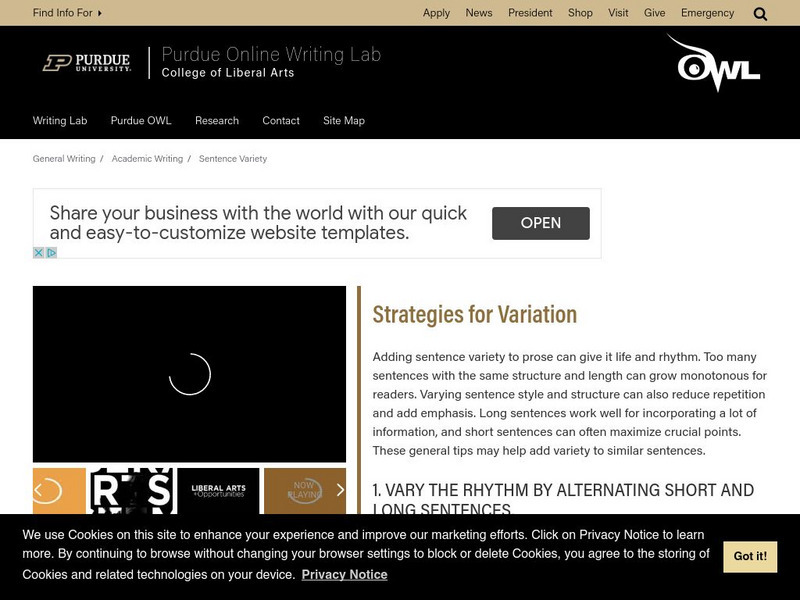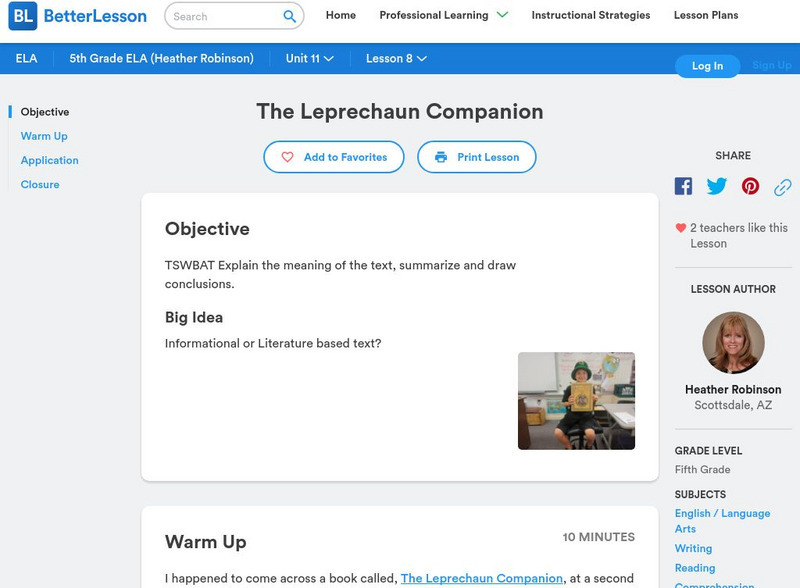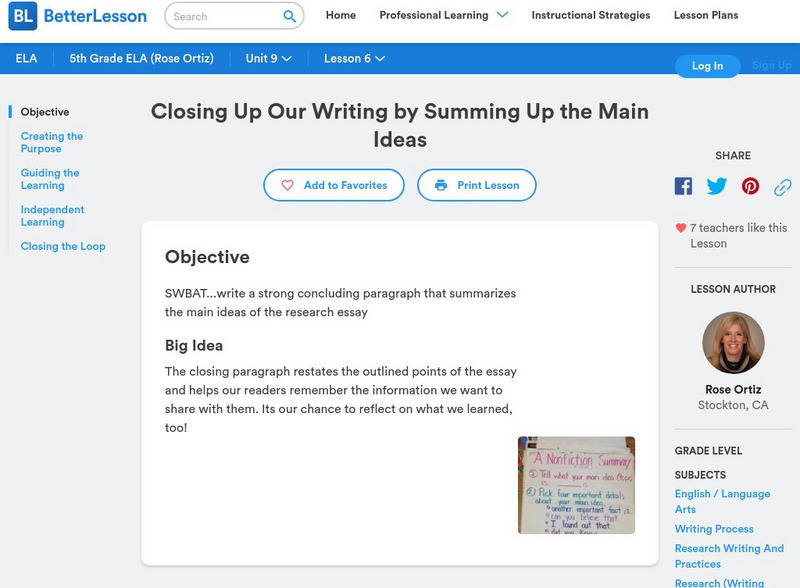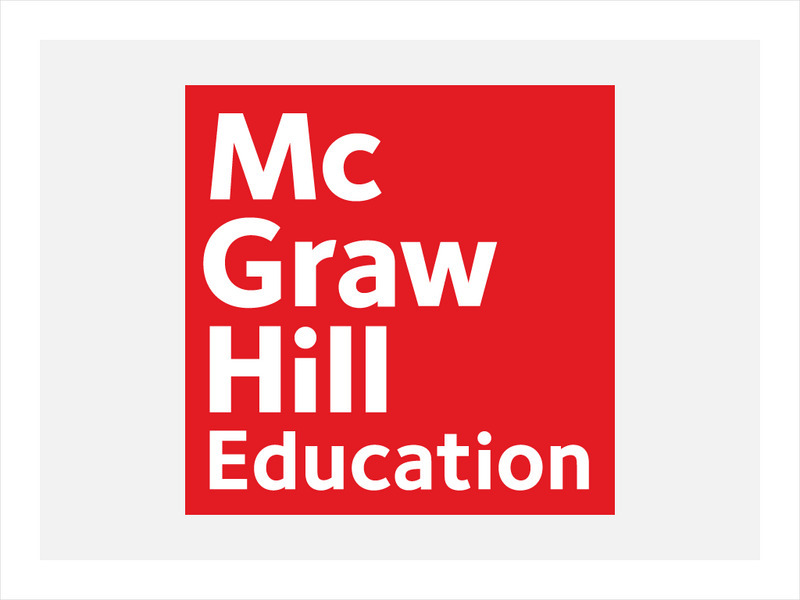Better Lesson
Better Lesson: Generally Speaking, Generalizations Can Generally Be Confusing
In this lesson, 5th graders learn how to identify a generalization in a text so that they can then spot lies or inaccuracies. Includes downloadable workbook with a generalization activity on page 53.
Better Lesson
Better Lesson: The True Story of Christopher Columbus
For this lesson, 5th graders analyze two nonfiction passages on Christopher Columbus to determine facts and author's bias and its influence on the readers.
Online Writing Lab at Purdue University
Purdue University Owl: Academic Writing: Sentence Variety: Strategies for Variation
This lesson offers suggestions to help you fix short, choppy sentences, combine sentences with the same subject, and revise sentences that sound the same. L.11-12.3 Language Functions/Style
Better Lesson
Better Lesson: Nature's Fury: Performance Task Continued
In this lesson, 5th graders develop narratives by describing characters and creating a logical event sequence. This is part of a larger unit but can be taught separately.
Better Lesson
Better Lesson: The Leprechaun Companion
In this lesson, 5th graders will explain the meaning of a text and its genre, summarize it, and draw conclusions. They work with a book called The Leprechaun Companion which is a cross between informational and literary text.
Better Lesson
Better Lesson: Closing Up Our Writing by Summing Up the Main Ideas
In this lesson, 5th graders will write a strong concluding paragraph that summarizes the main ideas of a research essay.
Other
Frist Art Museum: Before We Visit the Museum [Pdf]
In this lesson, 5th graders are asked to examine the rationale behind a class visit to a museum or other cultural center, what happens during such a trip, and why museums have rules in place for their visit. After exploring images of the...
Better Lesson
Better Lesson: What Is Plagiarism?
In this lesson plan, young scholars write summaries of researched information in their own words and quote text accurately.
Utah Education Network
Uen: 5th Grade Opinion Writing Prompt
In this lesson, 5th graders are asked to write an opinion about whether the United States should stop using pennies. Their opinion must be based on ideas and information from the two reading passages provided.
Other
Literacy Design Collaborative: Partner Retelling of Narrative Text
In this lesson, the teacher reads a story aloud and students work with a partner to retell the story using sentence starters. Includes downloadable poster.
Better Lesson
Better Lesson: What the Heck Is That? Inferring the Purpose of an Object
In this lesson, 5th graders use their prior knowledge and inference skills to determine uses of unfamiliar objects. They participate in group discussions and analyze the key information they have in order to reach conclusions.
McGraw Hill
Mc Graw Hill: Speaking and Listening: Respond to Ideas and Questions
Excellent guidelines for how to ask and answer questions in order to have a productive group discussion.
BBC
Bbc Bitesize: Speaking and Listening: Standard English
Explains what standard English is and when it is used, the difference between formal and informal language, and non-standard forms of English such as those found in dialects.
BBC
Bbc Bitesize: Listening to Others and Building on Arguments
This resource explains how to listen carefully to someone to identify the points they are trying to make and how to use those points to add additional information to the discussion. Includes sentence starters to help frame what you want...
BBC
Bbc: Skillswise: Using Commas [Pdf]
Use this BBC Skillswise factsheet to learn more about commas, including how to use them in a series and how to separate less important parts of a sentence.
McGraw Hill
Mc Graw Hill: Vocabulary Acquisition and Use: Understand Figurative Language
Explains what similes and metaphors are and how they are alike and different. Provides examples and practice sheets for each.
BBC
Bbc: Skillswise: English: Reading: Dictionaries and Indexes Quiz: Level One [Pdf]
Quiz testing basic alphabetization and dictionary skills required for real-world application. Three levels of difficulty with answers provided.
Better Lesson
Better Lesson: Movie vs. Book
For this lesson, learners compare the video version of the teleplay "The Monsters are Due on Maple Street" to the actual teleplay. (A teleplay is a play or script written for television.) The links to media in this lesson no longer work,...
Indiana University
Indiana University East: Writing Center: Transitions: Understanding Signal Words
This resource page provides nine lists of signal words and what they mean. Covers words that show time, addition, contrast, comparison, illustration, location, cause and effect, conclusion or summary, and emphasis or clarification.
Scholastic
Scholastic: What's Another Word For? What's the Opposite Of?
Check out these creative ways to teach students about synonyms and antonyms. Features a great list of ideas for teachers to include in their lesson plans.
BBC
Bbc: Voices: Schools: Speech Styles and Standard English [Pdf]
Some activities to do with students to help them understand about dialects and accents. Presents a poem written phonetically with a Londoner's accent, two more poems with lesson ideas, and a story with some non-standard English words...
PBS
Pbs: How to Use Commas for Yes, No, Tag Questions, and Direct Address
Models how to use commas with offset elements such as yes, no, or a tag question. Includes downloadable reference sheet, a short student exercise, and an answer key for the teacher.
Reading Rockets
Reading Rockets: Developing Academic Language: Got Words?
This is a research-based article concerning how to best teach academic vocabulary. Research finds that most teachers assign and mention vocabulary, but to be effective, instruction must be direct and meaningful. Recommendations for...
E Reading Worksheets
E Reading Worksheets: Text Structure
This resource focuses on text structure by defining the types of organizational patterns and providing examples of each. These are followed by a list of links to practice activities on text structure and main idea, as well as some videos.






![Frist Art Museum: Before We Visit the Museum [Pdf] Lesson Plan Frist Art Museum: Before We Visit the Museum [Pdf] Lesson Plan](https://static.lp.lexp.cloud/images/attachment_defaults/resource/large/FPO-knovation.png)





![Bbc: Skillswise: Using Commas [Pdf] Handout Bbc: Skillswise: Using Commas [Pdf] Handout](http://lessonplanet.com/content/resources/thumbnails/411271/large/bwluav9tywdpy2symdiwmduymc0ymtm1my0xnnlwa3btlmpwzw.jpg?1589993559)

![Bbc: Skillswise: English: Reading: Dictionaries and Indexes Quiz: Level One [Pdf] Unknown Type Bbc: Skillswise: English: Reading: Dictionaries and Indexes Quiz: Level One [Pdf] Unknown Type](http://lessonplanet.com/content/resources/thumbnails/411269/large/bwluav9tywdpy2symdiwmduymc0ymtm2my04ehi2ajquanbn.jpg?1589993559)


![Bbc: Voices: Schools: Speech Styles and Standard English [Pdf] Activity Bbc: Voices: Schools: Speech Styles and Standard English [Pdf] Activity](http://lessonplanet.com/content/resources/thumbnails/411270/large/bwluav9tywdpy2symdiwmduymc0ymtm3ns0xdzc0addilmpwzw.jpg?1589993559)
